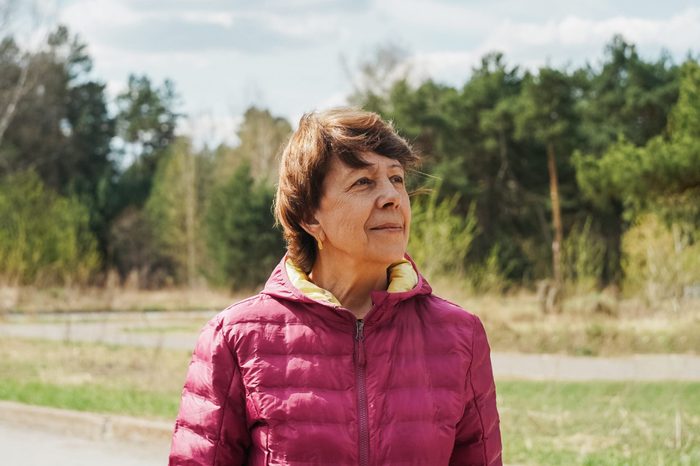
The average American spends 90% of their life indoors, according to December 2022 data from the US Environmental Protection Agency. Yet studies show that spending just a little bit more time outside can do wonders for our physical and mental health. A 2019 study published in Scientific Reports found that health benefits significantly increase with at least 120 minutes per week in nature.
The Centers for Disease Control and Prevention (CDC) recommends at least 150 minutes per week of moderate exercise. Marie Kanagie-McAleese, MD, at the University of Maryland Upper Chesapeake Medical Center, says you can hit this quota with a regular brisk walk of 20 or 30 minutes each day—and can benefit from the improved physiological and psychological outcomes that exercise and nature provide.
One Major Effect Walking Has on Your Dementia Risk, Says Research
Health benefits of walking outside

Walking outside improves heart health
Dr. Kanagie-McAleese says, “Spending time in nature has been shown to lower your blood pressure and increase your heart rate variability—how quickly your heart rate increases with activity or stress, and decreases with rest and relaxation.” A higher heart rate variability is healthier, Dr. Kanagie-McAleese says. This means the more your heart rate adapts to circumstances, the better…and nature has an impact on conditioning this.
Exercise also has a similar effect on these two measures of heart health. So, she says, “the effects are amplified” when you combine the two.
Cardiologists Recommend 3 Gentle Exercises for a Healthier Heart

Walking outside yields better lung function
Advanced practice registered nurse Christine Kingsley, APRN, the health and wellness director of the Lung Institute, says: “Right from the onset, outdoor walking allows you to breathe in fresher air.” This fresh air widens your airways, reducing inflammation and improving the lungs’ ability to exchange oxygen and carbon dioxide.
Kingsley explains: “As walking is a physical activity, performing this practice on a regular basis increases lung capacity by challenging normal breathing processes and encouraging the lungs to breathe in more air.”

Walking outside gives you a better workout
If you’re walking around your house or on a treadmill, you’re already reaping the benefits of getting your daily steps in.
But compared to this controlled indoor environment, walking outside can help you burn more calories and build strength because it forces you to use more muscles to navigate varying and uneven terrain, Kingsley explains. An outdoor landscape can also help improve mobility, balance, and coordination.

Walking outside helps manage stress
One of the best-studied benefits of spending time in nature is its ability to soothe the body’s stress response. There are two main theories behind this effect.
First, changing natural scenery helps to overcome the mental fatigue associated with daily life, creating space for mindfulness, better focus, and creativity.
Second, spending time outdoors activates the parasympathetic nervous system, which controls the body’s ability to relax.
And, after just a small period, you’ll probably feel yourself start to exhale with the effect: “Research has shown that nature-rich environments help reduce mental distress in as little as 10 minutes,” says Jennifer Bahrman, MD, assistant professor of psychiatry and behavioral sciences with McGovern Medical School at UTHealth Houston.

Walking outside may reduce your risk for depression
Says Harold Hong, MD, a board-certified psychiatrist at New Waters Recovery in North Carolina: “Studies show that outdoor activities like walking can reduce rumination, a form of repetitive negative thinking.” Rumination has been demonstrated as a risk factor for mental illness.
Research published in the journal PNAS also found that going on a walk through a natural environment leads to reduced activity in the area of the brain associated with depression. In addition, taking your walk outside on a bright day can help you get a dose of the sun’s vitamin D. While there’s not enough evidence that vitamin D deficiency causes depression, “research does indicate a correlation between the two, as deficiencies of vitamin D can lead to depression-like symptoms,” Dr. Bahrman says.

Walking outside can improve your sleep
If you’ve heard that wives’ tale that fresh air can help a baby sleep, turns out there’s some scientific truth…and it applies to grownups, too.
A 2020 study published in Sport Sciences for Health found that a daily walk had a significant effect on the sleep quality of young adults. Taking this practice outside may lead to even greater benefits: Exposure to sunlight during the day is crucial for regulating the body’s circadian rhythm, or natural sleep-wake cycle. (The effect of sunlight on your sleep cycle also helps manage symptoms of seasonal affective disorder, a type of depression triggered during the winter months.)
Signs of Season Depression? 7 Simple Strategies to Help You Feel Better

Walking outside could lower chronic disease risk
Combined, these health benefits of taking your walk outside are effective ways to promote long-term health and wellness. For instance, decades of research has linked chronic stress and insufficient sleep as significant risk factors for a range of chronic diseases—so proactively managing these lifestyle factors can help keep your long-term health in check.
“Because [walking outside] improves cardiovascular health by increasing lung capacity and boosting respiratory functions, it can result in lower blood pressure and inflammation, keeping chronic diseases like heart disease, stroke, type 2 diabetes, and some cancers at bay,” Kingsley says.
She adds that a little vitamin D each day goes a long way, too. In addition to reducing depression risk, an optimal vitamin D level improves immune system function, keeping you healthier today…and, as you age.
Keep your body and mind at their best with The Healthy @Reader’s Digest newsletter and follow The Healthy on Facebook, Instagram, and Twitter.
Read more by Leslie Finlay, and continue:

